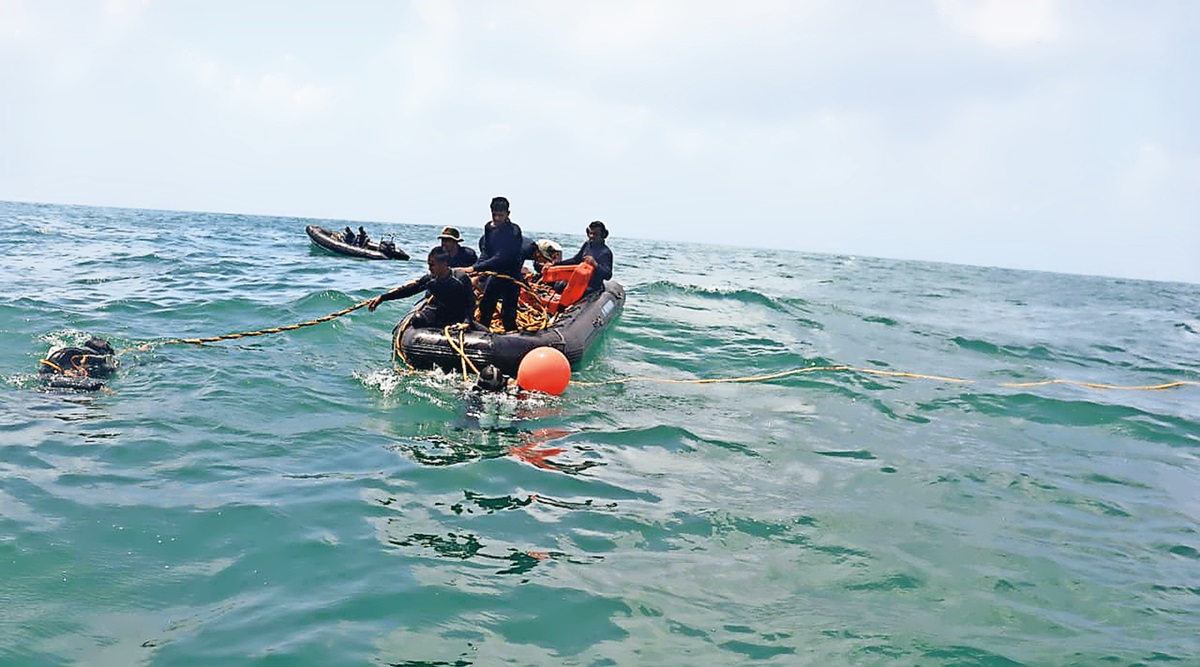 INS Makar conducts diving operations over the wreck of Varaprada. (Photo: Indian Navy)
INS Makar conducts diving operations over the wreck of Varaprada. (Photo: Indian Navy) The tugboat Varaprada, which sank in the Arabian Sea off Mumbai during Cyclone Tauktae leading to the death of 11 of its 13 crew members, did not send out a distress signal until 5 pm on May 17, more than 12 hours after it lost its anchor and went adrift, and seven hours after it started taking in water. Francis K Simon, the ship’s chief engineer — one of the two survivors from the tugboat — told The Indian Express that the boat sank within an hour of the distress call.
It was anchored outside JNPT on May 16 night one km from the Gal Constructor, the AFCONS barge that it had towed from Mumbai High up to the port, after the captain decided that it was a safe enough spot.
Overnight, as the wind speed picked up, both vessels lost their anchors and went adrift in separate directions. The barge ran aground in Palghar. All 137 people on board were rescued. Varaprada sank 20 km from the shore with 11 of its 13 crew on May 17 evening after struggling against the cyclone the whole day.
In the initial hours, the Varaprada crew made an attempt to head back to the shore, but, said Simon, it was not possible after 10 am, when water entered the vessel’s engine room.
The water pump on board was not working, so the crew had to manually bale out the water. The engine room was at the bottom-most deck of the ship, the first deck was for the crew, the second deck for the officers, and the wheel house on top.
“The water gradually filled in the engine room and by afternoon I told Captain Nagendra Kumar that the situation is out of control and pleaded with him to inform our company and other authorities like Indian Coast Guard and Navy. Kumar sent the distress call only at 5 pm or 5.30 pm to the Maritime Rescue Coordination Centre. I believe there was a delay on his part in sending the distress call,” Simon said.
An Indian Navy official said the Navy had not received a distress call from Varaprada. Simon and the other crew member were rescued by chance when INS Kolkata spotted them on a life raft, while on its way to rescue people on board barge P 305, the other vessel that sank leading to the deaths of 73 of the 261 people on board.
Simon also said the captain could have made an effort to enter the JNPT on the night of December 16. “That would have prevented the entire incident,” he said.
These remarks by Simon are also part of a written statement he has given to the Yellow Gate police station. The chief engineer, who has been in the merchant navy for over 20 years, also met officials of the Mercantile Marine Department of the Directorate General of Shipping, before flying back to his home in a Kochi, and told them that the 34-year-old tugboat was poorly maintained and not fit for sea. Francis said the officials had asked him to send a written statement.
“We were some distance from JNPT and could see the shore. On instructions from Gal Constructor, we did not tug it all the way inside the port but anchored it outside. As its support vessel, we anchored ourselves a kilometre away in case it needed emergency towing. Permission is needed from port authorities to enter. Our captain did not get permission to enter. Gal Constructor too may not have got the permission for some reason. All this would not have happened had the permission been given,” said Simon.
The chief engineer said that at that point, the captain should have told the owning company and the authorities that the tugboat was not seaworthy and should be allowed to enter, “but the captain and the company took a chance and underestimated the power of this cyclone”.
Speaking to The Indian Express from Kochi, Simon said that in every ship, the engine room is to protect it from water ingress in any weather conditions. “But Varaprada was poorly maintained and unfit to sail. I told DG Shipping officials that the tugboat was not fit for sea and asked how they had given it a licence to sail. It’s a man-made disaster that cost 11 innocent lives. I saw the crew dying. Their families are crying and asking me their whereabouts. The department said give us a detailed statement, which I will send to them. I told them strict action must be taken so that such an incident is not repeated. Glory (the company that owned Varaprada) ignored all safety measures,” Simon said.
Emails sent by The Indian Express to the five email ids given on the website of Glory Ship Management Pvt Ltd went unanswered. A phone call and SMS sent to Managing Director Rajesh Kumar Shahi seeking their version went unanswered.
Phone calls, text messages and WhatsApp messages to Amitabh Kumar, DG Shipping, also remained unanswered.
“The Yellow Gate police must investigate in detail if International Labour Organization’s SOLAS (Safety of Life at Sea) convention and MLC 2006 (Maritime Labour Convention 2006 – Gazetted in India on 29th February 2016) were implemented in its spirit or not. These rules were made to ensure such major tragedy do not take place. The owner of the barge, ONGC, and the Director General of Shipping are responsible for conducting inspections and ensuring that the safety of life and living conditions are followed as per ILO conventions,” said Naresh Birwadkar, general secretary of Forward Seaman’s Union of India.
- The Indian Express website has been rated GREEN for its credibility and trustworthiness by Newsguard, a global service that rates news sources for their journalistic standards.

